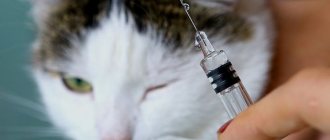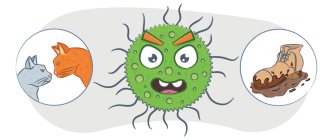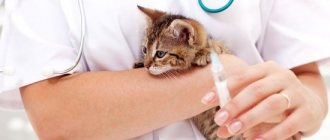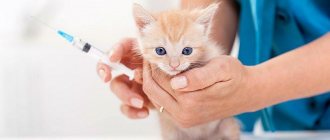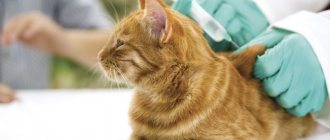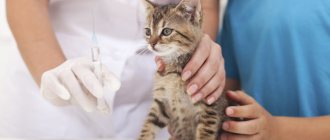Caring for your pet’s health is expressed not only in proper care and feeding. It is important to prevent your cat from becoming infected with dangerous infectious diseases, primarily rabies. This is a fatal disease that can only be recognized at a stage when treatment is no longer useful. Moreover, a cat with rabies will become dangerous to others, and rabies is no less dangerous for people. If a person bitten by an infected animal shows symptoms of this disease, then this is already 100% fatal, the only question is time. Therefore, rabies vaccination is the only way to protect against this disease.
Content
- Types of rabies vaccines
- At what age can cats be vaccinated?
- How to prepare an animal for vaccination
- Post-vaccination period
Does a domestic cat need vaccination?
If an animal is walking on the street, a responsible owner will not even think about the need for vaccination. But if a cat lives in an apartment and does not have contact with street animals, is it really necessary? Veterinarians say that it is necessary, since there is still a risk of infection.
In what cases can a pet become infected with rabies?
- The cat runs out into the street through an open door, there is a possibility of contact with a sick animal.
- There are frequent cases of animals jumping out of windows, with the same consequences.
- Mice and rats often live in apartment buildings, and rodents can also be carriers of rabies.
- If owners take their cat with them to the dacha, the likelihood of the pet meeting a sick animal increases significantly.
In addition, your cat will need vaccinations if you take it with you on a trip. In this case, a mark is placed in the veterinary passport no less than 30 days after vaccination. The mark is also required for the animal to participate in exhibitions.
Is vaccination used after a bite in cats?
An unvaccinated cat walking on its own poses a potential danger to people. If such a cat bites or scratches a person, there is a risk of contracting rabies. If rabies is suspected, the animal should generally not be given serum or vaccine as this may mask signs of infection. If there is a high probability of infection in a cat, then the safest measure is to euthanize the animal. The alternative is strict quarantine for many months.
If the attacked cat has previously been vaccinated, then revaccination is indicated, followed by a quarantine period of at least thirty days and careful observation.
Is there a treatment for rabies?
Unfortunately, there is no treatment for cats with rabies infection. If rabies is suspected, the cat must be kept in quarantine and prevented from escaping or harming anyone. Additionally, your veterinarian is required by law to notify animal disease control authorities.
Can I get rabies?
Yes, the disease is zoonotic, meaning it can be transmitted from animals to humans. However, it is only transmitted by the bite of a rabid animal. The virus is present in the saliva of an infected animal only for a certain time.
“...seek medical advice immediately.”
If you are bitten by any animal that may be rabid, you should immediately wash the wound thoroughly with soap and water and seek medical advice without delay. Suspicious animals include stray or feral dogs or cats, as well as any wild animal, especially if it exhibits unusual behavior such as a lack of fear of people, excessive salivation, or aggression.
In February 2021, the World Health Organization issued a new recommendation for rabies and post-exposure vaccination in humans. Those who have been bitten and have not previously been vaccinated against rabies should immediately receive immunoglobulin (antibodies) followed by a series of vaccines. Those who have previously been vaccinated do not need immune globulin but will still receive multiple vaccines against the virus.
Types of rabies vaccines
Several types of vaccines are used in veterinary medicine. All of them are multicomponent, that is, after one vaccination the animal receives immunity from several diseases. The price of the vaccine depends on its type. The following drugs are common today:
- Nobivac Rabies. A multicomponent vaccine that protects against rabies, rhinotracheitis, panleukopenia (distemper), and calcivirosis. The first vaccination is given no earlier than 8 weeks of age. Stable immunity is formed after revaccination, which is carried out after 3 weeks. One dose costs about 370 rubles.
- Quadricate. Complex vaccine against rabies, panleukopenia, respiratory diseases. The drug does not contain live strains, so it is easier to tolerate and completely safe. Vaccination is carried out at 4 months, revaccination is carried out annually. One dose costs about 600 rubles.
- Defensor 3. Provides lasting immunity against rabies. It is administered once, to kittens from 3 months of age. Revaccination needs to be done every 3 years. The cost of one dose is about 100 rubles.
- Rabisin. Used to prevent rabies in many animals. Cats are administered twice - the first time from 3 months of age, the second time a year later. The cost of one dose is about 200 rubles.
It is difficult to say which vaccine is the best. All of them are high quality, tested. The choice of drug is based on the individual characteristics of the pet, the capabilities of its owner, and the desired effect.
Why does a cat need a rabies vaccination?
Rabies in cats is a disease with 100% mortality. This is due to the lack of treatment methods, the presence of a long latent period and deep damage to the nerve cells of the brain at the onset of clinical manifestations of the disease. Therefore, vaccination against rabies is included in the list of annual mandatory vaccinations and is controlled at the state level.
In Russia, rabies is registered everywhere. Cats become infected through contact with the saliva of a sick animal during a fight. Not only the bite is dangerous, but also damage to the skin or mucous membranes by claws that have been exposed to the rabies virus.
A cat can also come into contact with an infected object or food while the pathogen is still active. Therefore, if the rabies vaccine has not been administered, infection can occur at any time.
But the main danger is that a sick animal can easily infect a person even with minimal contact.
Important! The first clinical symptom of rabies is often not aggression, but excessive affection and intrusiveness. Infection can occur when the cat licks the owner's face or hands, bites him lightly, or simply rubs his fur against unprotected areas of the body.
If a person is not given the rabies vaccine on time, he will soon develop clinical signs of the disease and death will be inevitable.
When wondering whether a domestic cat needs a rabies vaccination, owners need to know that transporting an animal without vaccination is prohibited.
Why is vaccination necessary for pets?
A cat needs to be vaccinated against rabies even if it does not leave the house or apartment. This is due to several factors:
- Legal requirements. According to Article No. 249 of the Criminal Code of the Russian Federation, the owner may be held criminally liable for failure to comply with veterinary rules, which led to the infection of other people or the spread of dangerous infections.
- Possibility of quarantining a cat in case of aggression or inappropriate behavior.
- The possibility (albeit minimal) of a cat becoming infected with a virus brought from the street on clothes, shoes and household items.
- Impossibility of obtaining documents for exporting an animal abroad.
- Inability to participate in exhibitions, tournaments and use in breeding.
Separately, it is worth drawing the attention of owners to point No. 2 about placing the cat in quarantine. This means that a pampered pet ends up in an unfamiliar room where dozens of animals with various infections are kept.
For 10 days, specialists observe the cat’s behavior and, if there are suspicious signs, leave it for another 60 days.
Important! Pain in cats often manifests as aggressive behavior. The cause may be banal intestinal colic, which the owner is not aware of and begins to look for symptoms of rabies in such inappropriate behavior of the pet.
It is also necessary to give a rabies injection to cats that never leave the premises, but there is a dog in the house that regularly walks outside.
At what age can cats be vaccinated?
The first vaccination is given at 3 months, unless there are indications for earlier vaccination or, conversely, contraindications. This period is due to the fact that the kitten’s body contains antibodies received from its mother, and only from 8 weeks their level decreases. There is a risk of infection from the first days of life, but it is not advisable to vaccinate a newborn kitten - antibodies transferred from the mother destroy some of the microorganisms introduced with the drug, and its effectiveness decreases. Therefore, the optimal age for rabies vaccination in cats is 3 months. If vaccination was carried out earlier than 3 months, it is repeated in due time. It is acceptable to vaccinate pets at 4-5 months.
As is clear from the above list of drugs, each has its own characteristics and duration of action. But, mainly, the vaccine is administered once, and revaccination is required every year.
Is vaccination of people after a bite always effective?
“Anti-rabies antibodies produced by vaccination after a bite are only effective if they are administered before the rabies virus enters the nervous system.”
Rabies antibodies produced by vaccination after a bite are only effective if they are administered before the rabies virus enters the nervous system. Once in the nerve cells, the virus spreads along the nerve fibers, where it is protected from attack by antibodies. Therefore, the use of the vaccine is important for people who have been, or may potentially be, bitten by a rabid animal. Of course, for people who are potentially at high risk of contracting rabies (such as veterinarians and wildlife control officers), it is preferable to be vaccinated in advance.
How to prepare an animal for vaccination
To ensure that the procedure does not cause complications, the cat needs to be prepared. The range of events includes:
- Anthelmintic drugs - these are given 2 weeks before visiting the veterinary clinic.
- Ridding an animal of fleas.
- Monitoring the pet’s condition a few days before vaccination - appetite, well-being, condition of the coat, eyes, ears should be normal.
- On the eve of vaccination, the cat's body temperature is measured.
Video on how to measure an animal's temperature at home:
Before giving the injection, the doctor again measures the temperature, collects anamnesis, and examines the pet. If there are no contraindications, vaccination is carried out. If it is repeated, you need to vaccinate according to the same rules.
Contraindications to vaccination are:
- increased body temperature of the animal;
- individual intolerance to the components of the drug (an allergic reaction to the vaccine is possible);
- recent or acute infectious diseases (quarantine);
- exacerbation of a chronic disease.
The most popular types of drugs
All vaccines are divided into two types: live (attenuated) and inactivated. “Non-live” ones consist of “dead” viral bodies, and live types of injections consist of weakened strains. Vaccination against rabies of the “light” form is accompanied by a strong immune reaction caused by the fact that your pet is ill with a milder manifestation of the virus.
Vaccination is often free of charge - the owner can vaccinate the kitten at a veterinary hospital or at an on-site veterinary center where a domestic type of injection is used. The procedure is carried out in a veterinary clinic - the drugs require specialized storage with a special temperature regime and careful monitoring of the expiration date. Most drugs are imported analogues of the domestic vaccine "Rabican", widely used in private veterinary clinics:
- Quadrocket. An imported medicine that is effective against a number of infections.
- Felovax. It gained popularity due to its minimal side effects.
- Purevax RCP. Affects parvovirus, calicivirus and rhinotracheitis.
- Nobivak. Analogue of "Rabican". It has a targeted effect on a complex of infections.
Post-vaccination period
Usually the vaccine is administered intramuscularly, less often - subcutaneously. The standard dose volume is 1 ml. If the preparation is carried out correctly, the animal’s well-being remains normal. It is possible that the cat’s activity may be suppressed for 2-3 days, but this is not critical, and the animal’s condition will improve on its own.
A lump may form at the injection site if the drug was administered subcutaneously. It resolves on its own within a week. After intramuscular injection, swelling does not form.
Negative consequences after vaccination are possible, but only if the animal is not properly prepared and the procedure is carried out without taking into account contraindications. Serious complications are allergic reactions (anaphylactic shock), which cannot be foreseen if a particular drug is used for the first time. Therefore, after the injection, the animal must remain in the clinic under the supervision of a doctor for 20 minutes.
Rabies is a serious and dangerous disease for both the pet and its owner. Therefore, it is necessary to vaccinate your pet, regardless of whether it is walking outside or not. To save time and reduce stress in the animal, it is worth using multicomponent vaccines - they will provide immunity against several diseases, and you will not have to visit the veterinarian often.
What to do if suddenly an infection occurs?
Infection occurs both through a bite and through indirect contact with the carrier: shared bowls, interaction with an infected person, etc. If you suspect that the kitten may have become infected, you need to immediately isolate the cat and contact a veterinarian. During diagnosis, the pet is placed in isolation for a period of at least 1.5 months. When contacting a veterinarian, a revaccination will first be carried out, and then a full examination. If an animal with characteristic symptoms bites its owner, it also needs to monitor its condition during the incubation period.
Unfortunately, if a dangerous diagnosis is confirmed, it is impossible to save the patient’s life. For safety reasons, corpses are burned to prevent the spread of infection. To prevent sad consequences, you need to vaccinate your cat against rabies on time.
The price of vaccination – quality or life
The cost of rabies vaccines varies widely from 300 to 2000 rubles. It depends on many factors. State veterinarians use drugs that are low cost and less effective. Private veterinarians use purified rabies vaccines from leading manufacturers with the least side effects.
In addition, there are monovalent (only for rabies in cats) and polyvalent remedies (plus for a number of other dangerous infections), which affects the price. The cost is also influenced by the region of residence, the manufacturing company and the status of the clinic you contacted.
By carrying out the necessary vaccinations on time, you will protect your pet from all dangers and preserve your health!
Was your cat bitten by a stray animal? Contact a specialist!
Unfortunately, cases of rabies in “stray” animals are not that uncommon. You've obviously seen packs of dogs attacking pets peacefully walking with their owners: they say, this is not your territory!
Has your pet been bitten? Don't waste another minute, contact your veterinarian. He will examine the animal and decide on further vaccinations. Perhaps he will get vaccinated against rabies without waiting for the due date.
The doctor will monitor the kitten for ten days. During this time, the animal should be isolated. Only after this period will it be possible to lift the strict quarantine.
If symptoms of the disease are detected, alas, your animal is doomed, and it will also pose a potential threat to surrounding people and other animals.
If the cat behaves normally after 10 days, without showing signs of inadequacy and aggression, then dynamic observation and isolation are extended to 1.5 months.
Can vaccination be dangerous?
Like everything in the modern world, veterinary medicine does not stand still, and its achievements in pharmacology have long stepped forward. A number of safe and effective drugs are produced that stimulate the development of intense immunity.
Don't be afraid for your pet: the vaccines have been tested many times on laboratory animals and successfully put into production. After their administration, domestic animals sometimes experience only slight lethargy or apathy, decreased appetite and rarely hyperthermia, which in most cases also occurs when vaccinated against other viruses. These symptoms should not cause alarm and will resolve without veterinary care.


